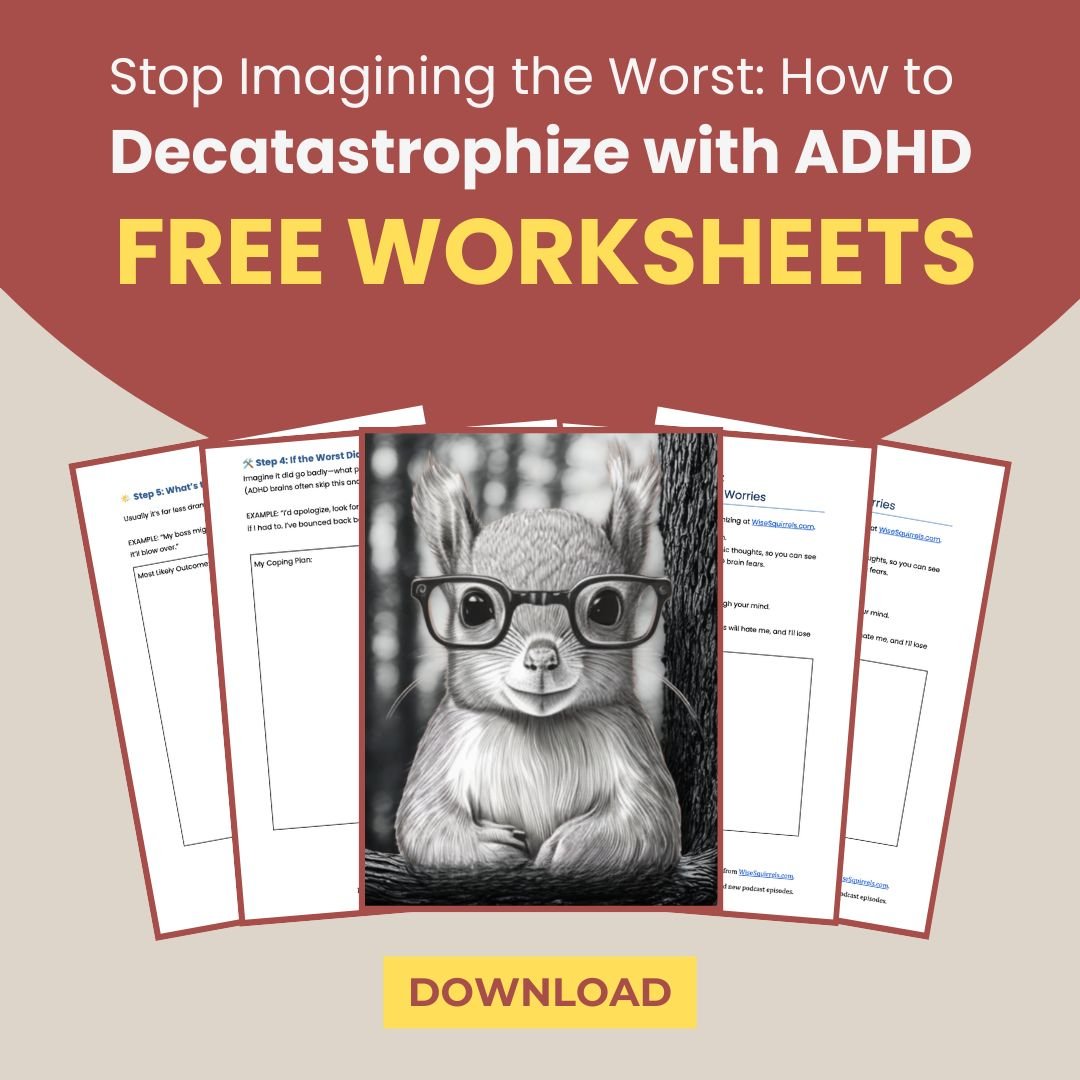Stop Imagining the Worst: How to Decatastrophize with ADHD
If you’re a late-diagnosed adult with ADHD (hello Wise Squirrel), you probably know all too well the trap of catastrophic thinking. It might sound like:
“If I miss this deadline, my whole career will unravel.”
“I forgot to reply, and now they’ll think I’m flaky and will never trust me again.”
“I can’t even start. If I fail, what’s the point of trying at all?”
This type of thinking is called catastrophizing, and it’s common for people with ADHD. Years of struggles with focus, follow-through, and organization can wire your brain to expect disaster around every corner. But there’s good news: you can learn to decatastrophize and step back, challenge these thoughts, and see things more clearly.
Why ADHD Makes Catastrophizing So Easy
Dr. J. Russell Ramsay, a former guest on the ADHD Wise Squirrels podcast and co-founder of the Adult ADHD Treatment and Research Program at the University of Pennsylvania, has spent decades helping adults with ADHD. He says that the most common “core schema” is deep-seated beliefs that shape your automatic thoughts, among adults with ADHD, failure.
When you’ve had repeated difficulties in school, at work, or even just keeping up with daily life, your brain starts to expect the worst. You might think in extremes: “If I’m not perfect, I’m worthless.” This all-or-nothing thinking turns everyday slip-ups into perceived catastrophes.
What is Decatastrophizing?
Decatastrophizing is a fancy term from cognitive-behavioral therapy (CBT) that simply means challenging your knee-jerk worst-case scenario thinking. Instead of letting your mind spin out horror stories, you take a closer look:
How likely is this really?
What’s the actual worst that could happen—and could I handle it?
What’s a more balanced or probable outcome?
Dr. Ramsay doesn’t always use the word “decatastrophizing,” but it’s built into the core of CBT. His work with ADHD involves identifying automatic catastrophic thoughts, reframing them, and then testing them in real-world situations.
How Wise Squirrels Can Break the Cycle
| 🔍 Decatastrophizing Step | 🧠 ADHD Strategy |
|---|---|
| Spot the thought: Catch “If I mess up, it’s over.” | Keep a thought record; write down automatic thoughts as they pop up. |
| Test the reality: How likely is the total disaster? | Challenge distortions: “Where’s the evidence? Have I bounced back before?” |
| Plan for coping: What would I do if it did happen? | Create step-by-step plans for feared situations to boost confidence. |
| Experiment: Try the task anyway. | Use behavioral experiments—start the project, have the hard conversation. |
| Reflect: What really happened? | Often the feared catastrophe doesn’t come true, which weakens the old fear loop. |
A Quick Decatastrophizing Exercise for ADHD Brains
Try it yourself the next time your brain shouts, “Everything is ruined!”
Write down the scary thought.
“If I submit this report late, they’ll fire me.”
Ask: What’s the worst that could happen?
“Maybe they’d be frustrated, maybe it affects my reputation.”
How likely is the absolute worst?
“Realistically, being fired over one late report is extremely unlikely.”
How could I cope if it did happen?
“I could explain, own the mistake, and improve next time. If it were that bad, I’d look for another job like I’ve done before.”
What’s more likely?
“They might be annoyed, I might need to apologize, then we all move on.”
Reframe:
“It would be uncomfortable, not catastrophic. I can handle uncomfortable.”
Why It’s Worth Practicing
ADHD often means a life dotted with dropped balls like missed appointments, forgotten birthdays, and last-minute scrambles. It’s no wonder our brains are primed to leap to “I’ve failed, again, so now everything is doomed.”
But by regularly decatastrophizing, just as Dr. Ramsay teaches, you train your mind to see setbacks as bumps, not cliffs. You’ll lower anxiety, build resilience, and start believing the truth: you’re capable of handling more than your catastrophizing brain tells you.
Late diagnosis or not, ADHD doesn’t have to mean living in fear of worst-case scenarios. You can learn to question those thoughts, shrink them down to size, and keep moving forward, imperfections and all.
🪹 Introducing The Nest. Join our community, learn, share, and support your fellow Wise Squirrels. Come see what's inside.
Looking for ADHD-aware coaching? Book a complimentary session with Dave at Futureforth.com.
Wise Squirrels is Sponsored by Futureforth.


